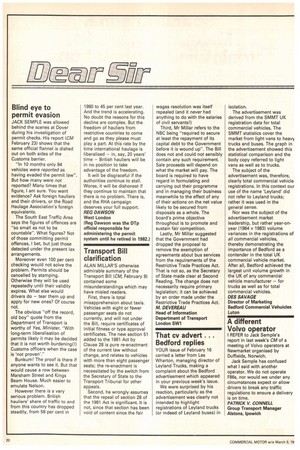Transport Bill clarification
Page 22

If you've noticed an error in this article please click here to report it so we can fix it.
ALAN MILLAR'S otherwise admirable summary of the Transport Bill (CM, February 9) contained some misunderstandings which may have misled readers.
First, there is total misapprehension about taxis. Vehicles with eight or fewer passenger seats do not currently, and will not under the Bill, require certificates of initial fitness or type approval certificates. The new section 51 added to the 1981 Act by Clause 28 is pure re-enactment of the current law without change, and relates to vehicles with more than eight passenger seats; the re-enactment is necessitated by the switch from the Secretary of State to the Transport Tribunal for other appeals.
Second, he wrongly assumes that the repeal of section 28 of the 1981 Act is significant. It is not, since that section has been void of content since the fair wages resolution was itself repealed (and it never had anything to do with the salaries of civil servants!) Third, Mr Millar refers to the NBC being "required to secure at least the repayment of its capital debt to the Government before it is wound up". The Bill does not and could not sensibly contain any such requirement. Sale proceeds will depend on what the market will pay. The board is required to have regard in formulating and carrying out their programme and in managing their business meanwhile to the effect of any of their actions on the net value likely to be secured from disposals as a whole. The board's prime objective throughout is to promote and sustain fair competition.
Lastly, Mr Millar suggested that the Government had dropped the proposal to remove the exemption of agreements about bus services from the requirements of the Restrictive Trade Practices Act. That is not so, as the Secretary of State made clear at Second Reading. The change does not necessarily require primary legislation; it can be achieved by an order made under the Restrictive Trade Practices Act. M. DEVEREAU Head of Information Department of Transport London SW1
















































































